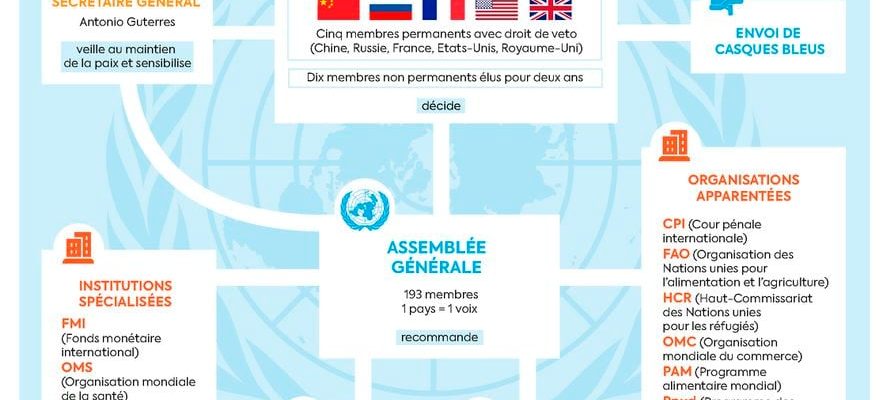The United Nations is going through a major crisis: the organization is struggling to impose a ceasefire and enforce international law in the two major conflicts of the moment, the war in Ukraine and the conflict between Israel and Hamas. For Richard Gowan, director of UN issues at the International Crisis Group think tank, the United Nations can still play a “valuable role” but, in a context of strong geopolitical tensions, it will be necessary to redefine the ambitions of the organization, and accept that it can only “mitigate the consequences of conflicts” and not, in many cases, resolve them.
we must prepare ourselves for the United Nations to play a less important role on the international scene in the future.
L’Express: The Secretary General of the United Nations, Antonio Guterres, spoke in September of the imminence of a “great divide” in global governance. Is the survival of the UN at stake?
Richard Gowan: Some draw parallels with the League of Nations in the 1930s, but I don’t think the situation is that serious: the UN is not on the verge of collapse. Certainly, the three decades of international cooperation during which the UN developed after the fall of the USSR are clearly coming to an end. We have entered a period characterized by increasingly open competition between great powers and deep tensions between the Western world and developing countries.
These tensions are manifested within the United Nations. They spread within the institution, poison it and make concrete results more and more difficult, in terms of peacekeeping or climate change. The UN is in trouble because international divisions undermine diplomacy.
To what extent have the war in Ukraine and the conflict in Gaza contributed to increasing dysfunction and undermining confidence in the institution?
The slow decline in cooperation within the UN dates back to 2011 and the start of divisions over the war in Syria. It accelerated from 2022, with the invasion of Ukraine, due to the deterioration of relations with Russia. At the start of the war, observers expected Russia to use its veto, but we believed it would continue to cooperate on other issues. This is less and less the case. Russia could well increasingly play this obstructive role within the Security Council.
Regarding the conflict between Israel and Hamas, I would say that it has really aggravated tensions between the West and the majority of UN members. Many Arab and African diplomats, already very critical of Western nations on development aid, but also on their selfishness in the Covid era, are saying today: “You are asking us to show solidarity with Ukraine, but you do not show the same solidarity towards the Palestinians.” Russians love this moment. They hope this will be a game changer for them. Putin seeks every opportunity to challenge the West and weaken it. And the UN is a very good place to do it.
NEW3797_COVER-CHASING-RUSSIA-OFF-UN
© / THE EXPRESS
Faced with this alarming observation, how can we reform the UN?
The majority of UN members want changes to the Security Council. Some powers, such as India and Brazil, are pushing for reform. But this nonetheless remains exceptionally difficult, partly for procedural reasons. In fact, two-thirds of the votes are needed to ratify a reform. Another difficulty is that many actors are opposed to it behind the scenes! China, in particular, fears that Japan and India will gain permanent seats. The first, for historical reasons. The second, because Beijing does not want New Delhi to become its equal.
“In the future, the UN will likely act in fewer crises”
And what about the right of veto, the main culprit for this paralysis?
I obviously strongly disagree with Russia’s use of its veto over Ukraine and the United States over Gaza. But if Washington, Moscow and Beijing did not have this right of veto, they would withdraw from the Security Council. For this reason, it is very difficult to imagine that anyone would be willing to give up this power. Rather, the challenge is to find ways to increase its moral and political price tag.
In 2022, the General Assembly passed a resolution – non-binding – stipulating that each time a member of the Security Council uses their veto power, they must justify it within ten days before the General Assembly. It’s an interesting idea. In the past, China was able to refrain from vetoing because it feared the bad publicity it would bring.
Next September the Future Summit will take place, intended to breathe new life into the organization. Are you optimistic?
It will make it possible to address certain subjects that will become essential in the next decade, such as artificial intelligence. Antonio Guterres suggested creating a new agency that will develop international regulations on this issue. But some countries, such as the United States and China, are slowing down. Realistically, if the outlook for peace and security becomes increasingly bleak, it will be difficult to find many areas of cooperation.
Should UN missions be restricted?
The United Nations can still play a valuable role if it succeeds in alleviating the suffering of populations in distress, whether in Gaza, Afghanistan or Syria. No one disputes that the world would be worse off if the UN humanitarian system did not exist, with its World Food Program or the Office of the High Commissioner for Refugees. We must therefore accept that the United Nations can only mitigate the consequences of conflicts and not, in many cases, resolve them.
In the future, the UN will probably act in a smaller number of crises, but the Security Council will nevertheless remain, in my opinion, a place where we can continue to address deep problems, if the powers see their interest in it. After all, even during the Cold War, the Security Council was able to agree on issues such as maintaining peace in the Middle East.
.
